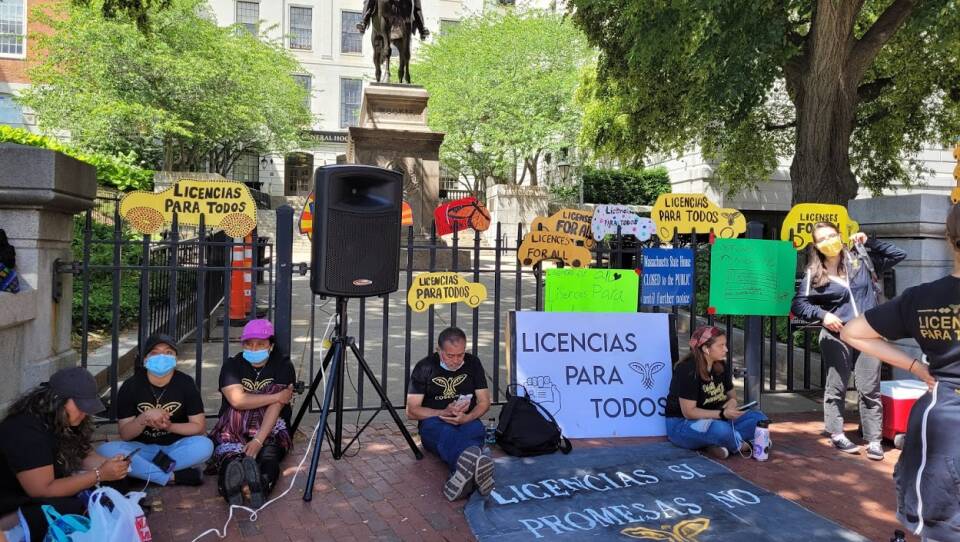Beacon Hill Democrats are taking on a particularly thorny and complicated political question later this week. Should people in the country illegally have access to official state driver's licenses? Making licenses available for everyone on Massachusetts roads has been a goal of immigration advocates and public safety officials for years. Mike Deehan, GBH News State House reporter, joined hosts Paris Alston and Jeremy Siegel on Morning Edition today to discuss. This transcript has been edited for clarity and length.
Jeremy Siegel: The State House will take up this bill, granting undocumented immigrants the right to a driver's license later this week on Thursday. What exactly would this legislation do to achieve that?
Mike Deehan: It would create a new type of I.D. that is really just a driver's license that allows anybody with the proper documentation to be on the streets legally. That really is the goal here, to get people who are already driving to be driving legally and with the proper certification.
So instead of a typical proof of citizenship or end of residency, applicants would need to provide to the RMV either a valid foreign passport or what's called a consular identification document from their home country. This is something that a lot of migrant workers or people who are in the country without citizenship might have from back home. Then they would need a second document that verifies date of birth, identity and residence in the commonwealth of Massachusetts.
So we would join 16 other states like Connecticut, New York, California and New Jersey that already have something like this in place, and it wouldn't go into effect until July 1st of next year, so there would be plenty of time to put a system in place.
Paris Alston: Mike, let's back up a bit. Why do advocates feel so strongly about this?
Deehan: It's really because people are driving already. They are driving their cars, they're getting to and from work. They have to be just like all of us on the roads. And there's really no way to do any kind of oversight without the licensing program that we already have. We do it for everyone 16 ages and up, who go through this process of getting officially licensed. So they think that more people would be insured if they're legally able to get insured.
That's really going to do a lot for a public safety argument. And we've seen a lot of public safety advocates coming on board this idea in saying that regardless of immigration status, regardless of federal priorities on immigration or deportation, we here in Massachusetts just want to make sure that people who are driving on our roads are licensed, they know how to drive and they have insurance. And this would go a long way to providing that.
Siegel: You mentioned 16 other states have done this. Have we seen success in those states? Is there any concern among undocumented immigrants about putting their names into a system in this way to get a license?
Deehan: Well, there's always going to be the resistance from the immigrant community in some instances to resist being part of any kind of government program, right? But this would definitely try to separate itself, make sure that it's not from a federal perspective at all.
But yeah, of course, there is kind of a deeper, almost philosophical discussion here that says that, you know, people who are in this country illegally without documents aren't entitled to a state I.D. or a state driver's license. They shouldn't be afforded that regardless of the safety issues that we're already talking about.
And I think that's why you're not going to see the typical bipartisan vote that you usually do on Beacon Hill when the House takes this up later this week. Republicans, they're not monolithic, of course, but they have said over and over again that they don't want this kind of program to be extended to undocumented immigrants because they fear that different resources benefit other kinds of, I guess, fraud you'd call it, could be perpetuated or encouraged because Massachusetts is now giving driver's licenses to undocumented immigrants.
Alston: And how likely is it that Democrats would have enough votes to override a potential veto from Baker of the bill?
Deehan: I should have mentioned, Governor Baker is probably the most prominent of those Republicans who opposes this bill. He actually said yesterday that he still wants to stick to what the state has now, which is the federal program Real I.D. that is coming up when talking about airplane travel and things like that.
Baker, if he vetoes it, and he won't promise that he will, but he's not saying he won't when it comes to the floor — yes, it will pass with Democratic support, but that is the biggest question. Will it pass with enough to override a veto? Will it have that two thirds veto-proof majority?
Now this is one of those bills that's been kicking around for years, with over 51 percent of the Legislature already signed on as co-sponsors. So it's one of those things that has support to pass kind of built into it. But it could be a pretty tight vote, whether or not it's going to get to that two thirds. And I think that really shows that Speaker Ron Mariano, who's running the House now, he's showing that he's willing to put things onto the floor for full votes that are not 100 percent of a done deal the way his predecessor would have. So it really could go either way whether or not it's veto-proof.
"It will be a very tough vote for some of those moderate or conservative Democrats that are going to be up for reelection."-Mike Deehan, GBH State House reporter
Siegel: Mike, is there any political downside for Democrats going for a vote on this?
Deehan: This is what you get into with election year politics. It will be a very tough vote for some of those moderate or conservative Democrats that are going to be up for reelection. I think it's always important to remind folks that the majority of lawmakers, at least in the House but in Beacon Hill in general, are moderate to even conservative members of the Democratic Party. It's not the national party at all. They definitely have more purple leanings. More importantly, they have purple constituencies. So you're going to get a lot of blowback and backlash from the folks back home who might have a more conservative idea about who should and shouldn't be entitled to a driver's license.
So that's definitely a concern for Mariano and for the political thinkers who are trying to keep that supermajority as super as it can be. They don't want to lose seats over this. But at the same time, this has been a progressive priority for groups like MIRA, the immigrant coalition for a very, very long time. They've been fighting for this. So you can definitely see it as a win for progressives and maybe an uncomfortable loss for moderates or conservatives.
There are plenty of reasons to put this on the floor from a progressive standpoint, and there are some, you know, sensitive political reasons to not want to vote on it. It's almost guaranteed to pass the Senate. They've already expressed a lot of support for this kind of thing. So, those moderates and conservatives in the Democratic Party might have to hold their nose and do what the speaker wants on this one if it's going to come to the floor.










